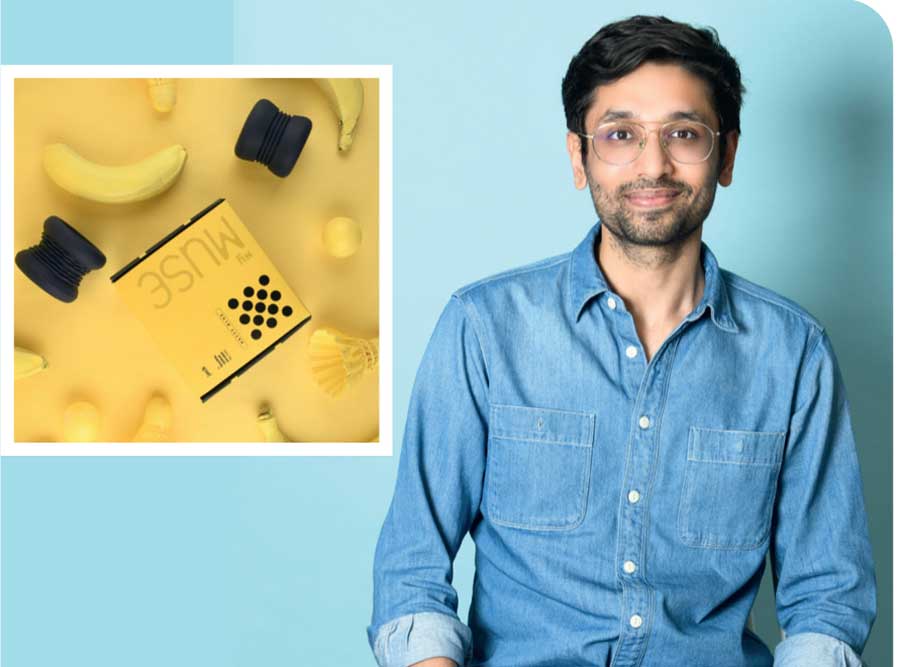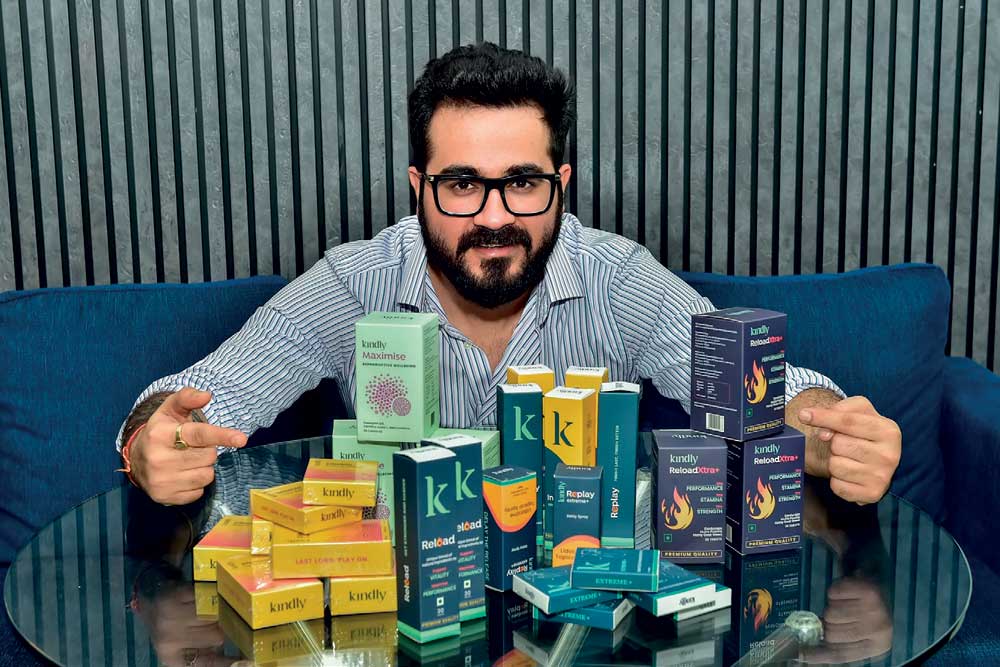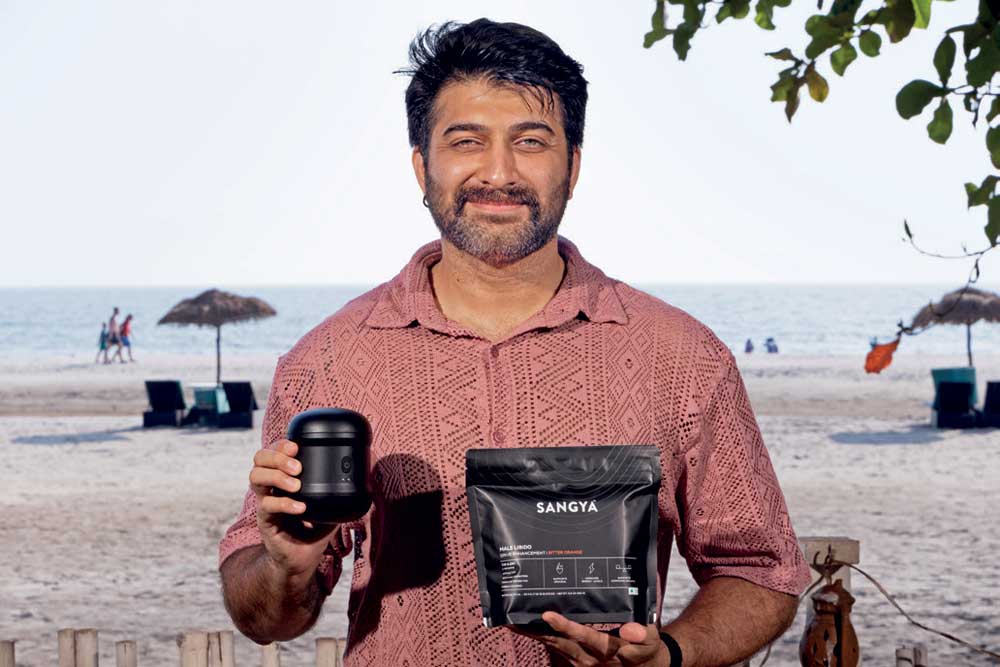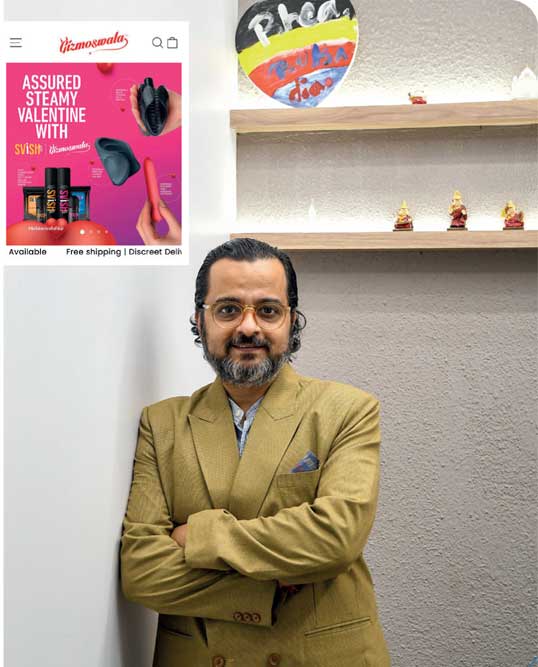Inside the Libido Industry
The market for male sexual wellness in India is booming with a number of new businesses launching products that make a taboo subject mainstream
 Lhendup G Bhutia
Lhendup G Bhutia
 Lhendup G Bhutia
Lhendup G Bhutia
 |
01 Mar, 2024
|
01 Mar, 2024
/wp-content/uploads/2024/03/Malelibido1.jpg)
(Illustration: Saurabh Singh)
The Ranveer Singh-Johnny Sins ad for a sexual wellness brand that went viral recently feels unusual in more ways than one. First is its odd setting. A Bollywood male superstar and a popular American porn star find themselves trapped within the confines of an Indian saas-bahu show. So much so that even when the characters speak about sex, they can’t help but do so in exaggerated innuendos. “Inki daali pe kabhi phool nahin khilta,” a woman says of her husband, when asked why she is leaving him. But move beyond the laughs and listen to the characters more closely. A woman is talking about her unfulfilled sexual desires. Her impotent husband, filled with shame, is being asked to seek help. The site where this drama is playing out may be the regressive confines of a saas-bahu show, but the concerns being voiced—about female desire and male sexual health—are very modern.
And then there is the unusual spectre of a Bollywood superstar endorsing a sexual wellness brand itself. Products that claim to boost a man’s libido have been around for years, and they have traditionally been viewed through the lens of the disreputable—an arena of “shady clinics”, “hack treatments” and “babaji ka churans”, as the press release announcing Singh’s association with the brand quoted him as saying—something no Bollywood royalty would touch with a bargepole. And Singh wasn’t just endorsing the firm. He had also, as he revealed later, come on board as the brand Bold Care’s cofounder.
It is reflective of the shifting attitudes currently underway in male sexual health. A plethora of male sexual products, from libido boosters in the form of edibles, sprays, and wipes, to sex toys like male vibrators and strokers, and many more, are making their way to the marketplace. They are being sold, not by shady firms and quacks, but by new-age sexual wellness startups which, flush with funds, are tying up with male social media influencers to de-stigmatise the conversations around male sexual wellness and ‘normalise’ the use of their products. You can today order these products, often with discreet packaging and within mere minutes, not from some unknown website but on the most popular e-pharmacies, e-commerce sites, and quick commerce platforms like Zepto. Equally interesting is the change in the language around this industry. Performance enhancers and sex toys are now ‘wellness devices’, and the act of masturbating while using these products, ‘self-love’.
There has been a boom in the sale of sexual wellness devices for women in India in the last few years, with the emergence of women-focused brands and the opening up of conversations around female desire, both online and in films like Lust Stories (2018) and Veere Di Wedding (2018). A similar openness towards male sexual wellness is now happening.

“The sexual wellness industry in India is experiencing significant growth, driven by changing attitudes towards sexuality and pleasure,” says Sahil Gupta, the cofounder of MyMuse, a popular sexual wellness brand. Gupta, who founded the firm along with his wife Anushka, began working on the concept during the early stages of their dating journey. As a young couple, Gupta says, when they experienced the lack of reliable sources for intimate products, they thought when there were numerous options available in various aspects of life, why should the bedroom experience differ for Indians? “Our vision was to establish a brand that obliterates taboos, challenges gender biases, and eradicates the shame associated with purchasing intimate products,” he says.
A Bollywood male superstar and a popular American porn star find themselves trapped within the confines of an Indian saas-bahu show. So much so that even when the characters speak about sex, they can’t help but do so in exaggerated innuendos
There have been no reports specifically about the size of the sexual wellness industry for male products, but a few that look at the industry as a whole. And, as Gupta demonstrates, these point to an industry that is expected to grow rapidly in the coming years. One such report, published by Allied Market Research, estimated that the industry was valued at $1.15 billion in 2020. “This number is predicted to grow to $2.09 billion by 2030, with a CAGR of 5.8 per cent,” he adds. “We have witnessed considerable growth across genders and cities year-on-year. While most of our business still comes from tier 1 markets, about 30 per cent of our business comes from tier 2 and 3 markets which is a positive sign.” Other firms are also seeing rapid growth. Bold Care, which caters only to men and was founded in 2019, for instance, claims it has grown 200 per cent year-on-year and processed over 15 lakh orders since its launch. During the last financial year, it claims to have clocked about $1.14 million in revenue.
Firms like MyMuse describe themselves as gender-neutral brands that cater to all genders and sexual identities. With about 60 per cent of its customer base currently made up of men, many of MyMuse’s products are specifically targeted towards them, from a male massager, vibrating and non-vibrating strokers, to a recently launched vibrating ring, dubbed the Loop, that also stimulates the partner and many other products.
Men are increasingly opening up to try out new things and experiences, says Aashish Mehrotra, the co-founder of the sexual wellness brand Sangya Project. Started in 2021 by Mehrotra , along with Shweta Sangtani and Tanisha RK—the three identify as a queer, poly family—many of Sangya Project’s products, from butt plugs to strap-on dildos, today are predominantly purchased by men. “That’s what’s interesting about what’s going on with male products right now. It’s not just simply, an ‘OK, I want to buy a stroker’ and that’s it. Men want to explore more with their bodies. I know of men who have ED [erectile dysfunction] and premature ejaculation. And they are using strap-on dildos so they can pleasure their partners longer,” says Mehrotra.

Unlike many other firms operating in this space, Sangya Project manufactures many of its products, instead of simply importing them from abroad. They have so far manufactured vibrators (purchased mostly by women), strap-on dildos, and butt plugs, and are now working towards producing their own vibrating stroker (for men) and two other products.
They began producing their own products, Mehrotra says, because they realised many of these products are not made keeping an Indian body type in mind. But there was also another reason. Many products can be overwhelming for a first-time user. “Many of these designs are for an advanced market. They can be very overwhelming for someone who is just starting out or has seen a sex toy for the first time. For instance, some designs are made to resemble body parts. Some strokers can be flesh-coloured, and have AI voices that speak and moan at the user. There’s a certain creepiness that comes with some of these products,” Mehrotra says.
The sexual wellness industry in India is experiencing significant growth, driven by changing attitudes towards sexuality and pleasure,” says Sahil Gupta, cofounder, MyMuse
In comparison, the vibrating stroker that Mehrotra’s firm currently sells, designed in-house, can be mistaken for a common household device like a Bluetooth-enabled speaker. It was done intentionally, Mehrotra says. “It looks like a fun tech thing that they just did, right? That’s what we were going for. There’s a running joke right now, that our stroker looks like a Bluetooth speaker. So, that’s how we are bringing that discreteness [to our products],” he says.
The boom in sexual wellness is bringing many new players into the market. According to Gupta, there were about 21 brands operating in this space in 2020. This has now grown to about 44. The Bengaluru-based firm Kindly Health is one of them. Originally positioned as a brand focused on reproductive health, they have reoriented themselves to focus more on male sexual health and wellness. “We realised that more than reproductive health, the kind of calls we were getting from consumers showed they were more stressed about sexual health. Also, reproductive health requires more capital,” says Nilay Mehrotra, the co-founder of Kindly Health.

Today, they sell a variety of supplements to improve male sexual performance, but the one product that has really taken off, Nilay says, is a new type of wipe that it claims can help a man perform better in bed. Called Pleaser Delay Wipes, it comes in a sachet form and can be carried with ease like one would a condom packet inside a wallet. “We launched this product seven months ago, and we started with a few buys monthly. Today, we are doing sales of close to 45,000 boxes, which is more than about 2.5 lakh wipes monthly,” he says.
More than reproductive health, the kind of calls we were getting from consumers showed they were more stressed about sexual health. Also, reproductive health requires more capital,” says Nilay Mehrotra, cofounder, Kindly Health
Gizmoswala, another firm in the sexual wellness space which was launched in November 2020, has been witnessing rapid sales with every passing year. “We used to get 50 orders monthly in the first few months. But now, monthly orders tend to be between 2,000 to 2,500. Even the average value of an order has gone up,” says Nirav Mehta, who founded the firm along with Pooja Nandi and Ranjan Periwal.
Mehta, who was also featured along with his co-founders in an episode of Shark Tank, the popular show where entrepreneurs pitch their ideas to investors, attributes this growth of the market to a maturing audience. Many of his products today are available on e-pharmacies and e-commerce platforms, and even doctors prescribe his products like the penis pump to patients suffering from erectile dysfunction. Till about 10 months ago, about 70 per cent of all his products were purchased by women. Today, he says, men make up about 60 per cent of the client base. “I think men are becoming more open. They are willing to try out new things,” he says.
A lot of the growth in sexual wellness occurred during the pandemic. “People were just bored staying at home. So, many began trying out these products,” says Rahber Nazir, the founder of Kaamastra, one of the earliest sexual wellness firms in India. “But I think since then, the market has just sort of generally opened up.”
It isn’t just that more people are buying sexual wellness products, Nazir says, but many—both men and women—are now asking for very specialised products. “People are actually demanding certain things and caring about their pleasure. And that’s actually a really good thing. It makes us more excited about the market because we like serving an educated customer. Men, for instance, are now beginning to shell out anywhere between ₹5,000 to ₹10,000 for more advanced flesh-lights, instead of the basic ones which cost ₹1,500. “These high-end ones are really good, and they come with all kinds of options like vibration speeds, heating options, and things like that,” he says. “It’s becoming a very exciting time to be in the industry.”

Animesh, a married IT professional whose name has been changed upon request, recently began using a vibrating stroker and male massager. A 43-year-old currently based in Mumbai, he began using libido-boosting supplements about seven years ago because he felt either the stress of his job or hitting middle age was beginning to affect him. He has shifted several brands in the last few years. And recently, in a spirit of excitement, he says, he began to use strokers and massagers too.
“I like to be frank about these things. It was either because I was getting well into my 30s, or because of the demands of my job or something. But it [a low sex drive] just crept up on me,” he says. He describes the introduction of strokers and massagers into the bedroom as “interesting”.
There is a lot of stigma attached towards men using sexual products. They say things like ‘this guy can’t get a woman, so that’s why he’s using this product,’” says Aashish Mehrotra, cofounder, Sangya Project
“There is a lot of stigma around talking about these things. I speak quite frankly with my wife, and I’ve even told a few friends and recommended these products,” he says. “But yes, I know it’s a very sensitive topic.”
Three young men lie across a couch in a YouTube video, wearing beauty-care face masks and sipping wine, while discussing subjects like masculinity and the pressures of dating. “I feel self-love is looked down upon,” one of them tells the other two, referring to the use of sex products to masturbate. “If I feel like wanting to be intimate with myself, then that’s like ‘Oh, so you can’t get a girl or what.’” And the others agree. In another video that has gone viral, a social media influencer Siddhesh Lokare (sidiously_) is introducing a male massager to his father. In yet another, Rahul Sridhar, a social media influencer, who goes by the handle @thehippiewriter on Instagram, when asked if using male products for masturbation does not make one feel emasculated, begins rapping about how these toys can help one perform better in bed.
These videos, collaborations between MyMuse and social media influencers, are attempts to reframe the conversation around the use of male sexual wellness products. These are needed, they say, because the use of such products tends to be filled with negative stereotypes and when a man uses such products, he is often viewed as either sexually deviant or incapable of finding a partner.
A plethora of male sexual products, from libido boosters in the form of edibles, sprays, and wipes, to sex toys like male vibrators and strokers, and many more, are making their way to the marketplace. They are being sold, not by shady firms and quacks, but by new-age sexual wellness startups
When Aashish Mehrotra began to share his experiences of using a stroker, the comments on his post were filled with abuse and hurtful comments. “They would say things like, ‘This guy can’t get a woman, so that’s why he’s using this product. He is not a man. He’s not masculine,’” Mehrotra says. In comparison, the comments left on posts discussing female products on his platform’s Instagram profile would be very different. “The comments would be filled with cheers and ‘You go, Queen’, and ‘Where did you buy it from?’” he says. Women tend to be more open about these products among friends, Mehrotra says, sharing information about them on their WhatsApp groups; men, by comparison, will never let even their best friend know they ever came close to such a product.
The taunts on social media for talking about the use of male products became so excessive that Mehrotra today promotes these products on social media only in the company of women. “We started including women in these videos where we get them to ask about the product or have her gift it to her boyfriend because she’s going away on a trip or something like that. This way, we get men to look at it as a tool. Instead of talking about just pleasure, we are leaning more towards the marketing of how this will help you last longer in bed,” Mehrotra says. “Emphasising the fact that this [product] is going to make me last longer and having women in the videos talk about it make the products a lot more palatable for a male audience.”

MyMuse has faced a lot of challenges in promoting these products. Before launching their male products, they found that most of the messaging and advertising tended to be hyper-sexual or catered to male insecurities. “If we had to change mindsets and challenge taboos, we had to do it in a way that made people feel good about themselves. Not ashamed or inadequate. This is why our brand messaging across the board is positive, playful, cheeky, and respectful,” Gupta says.
Men are becoming more open. They are willing to try out new things, says Nirav Mehta, cofounder, Gizmoswala
The surge of supplements, backed by stars like Singh, that claim to boost male libido however worries those trained in this field. “There is nothing new or scientific in these products,” says Dr Rajan Bhonsle, honorary professor and head of the department of sexual medicine at Mumbai’s KEM Hospital and GS Medical College, in reference to the claims made by Singh in the Bold Care ad. “They fall in the same category of herbal preparations, the so-called sex tonics that have been there for decades. They claim to help resolve issues like erectile dysfunction, but none of them really has any tests or evidence backing their claims,” he says. As Bhonsle explains, an issue like erectile dysfunction or premature ejaculation are symptoms. “You cannot treat a symptom. You must find the cause behind this. Maybe, it is uncontrolled diabetes; maybe, it is something else. That’s why a trained doctor will find out the cause behind these symptoms to treat the issue,” he says.
Such concerns, however, do occasionally occur to Nimesh (name changed upon request). A married marketing professional in his late 40s in Mumbai, he has been taking performance-enhancing supplements for several months now. “When I first started using it, I used to be worried if it was harmful in some way. So, I would give it up for some time. But then when it becomes difficult again [in bed], I start trying it all over again,” he says. “I don’t know if it even helps. Maybe, it is all psychological.”

/wp-content/uploads/2025/01/Cover-Forecast2025.jpg)












More Columns
IED blast in Chhattisgarh shows Maoists can still cause damage Rahul Pandita
Union Cabinet and PMO Reshuffle on Cards Short Post
A Politicised Fast Siddharth Singh